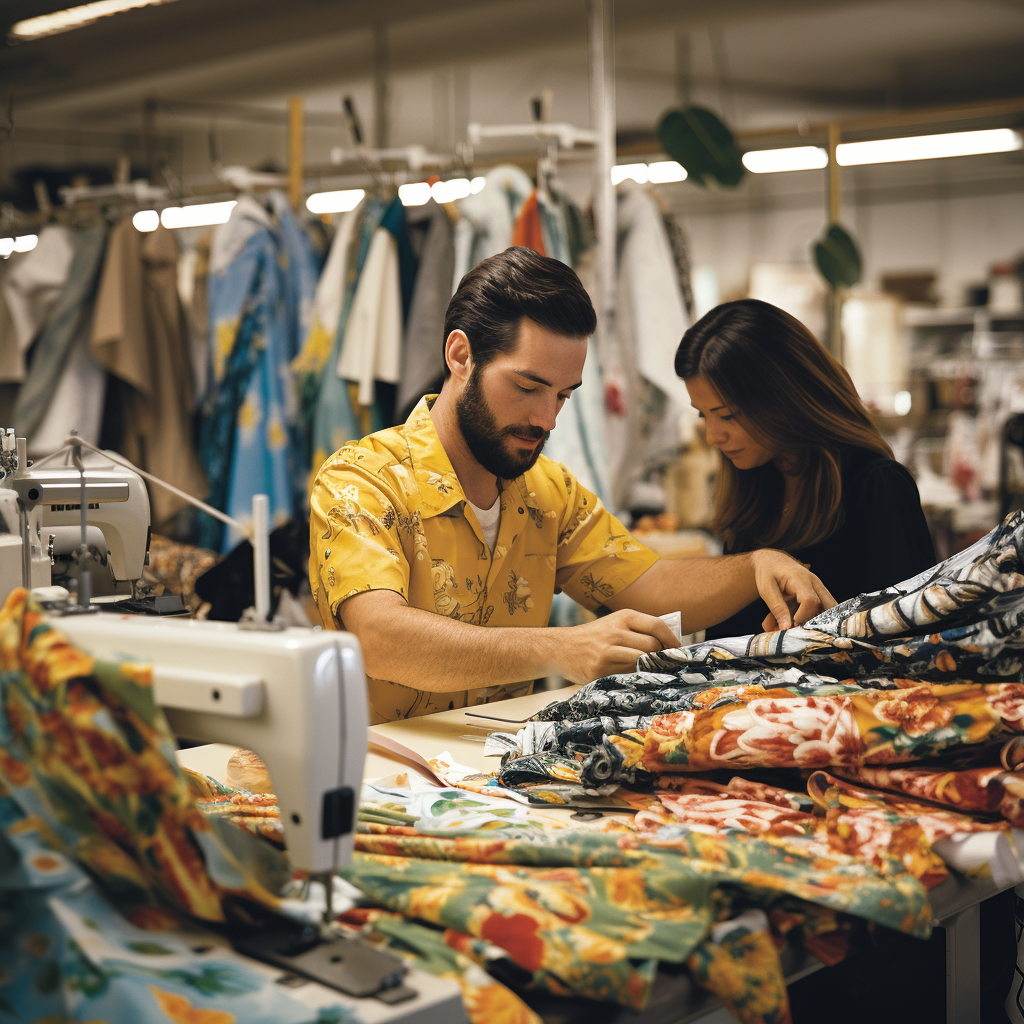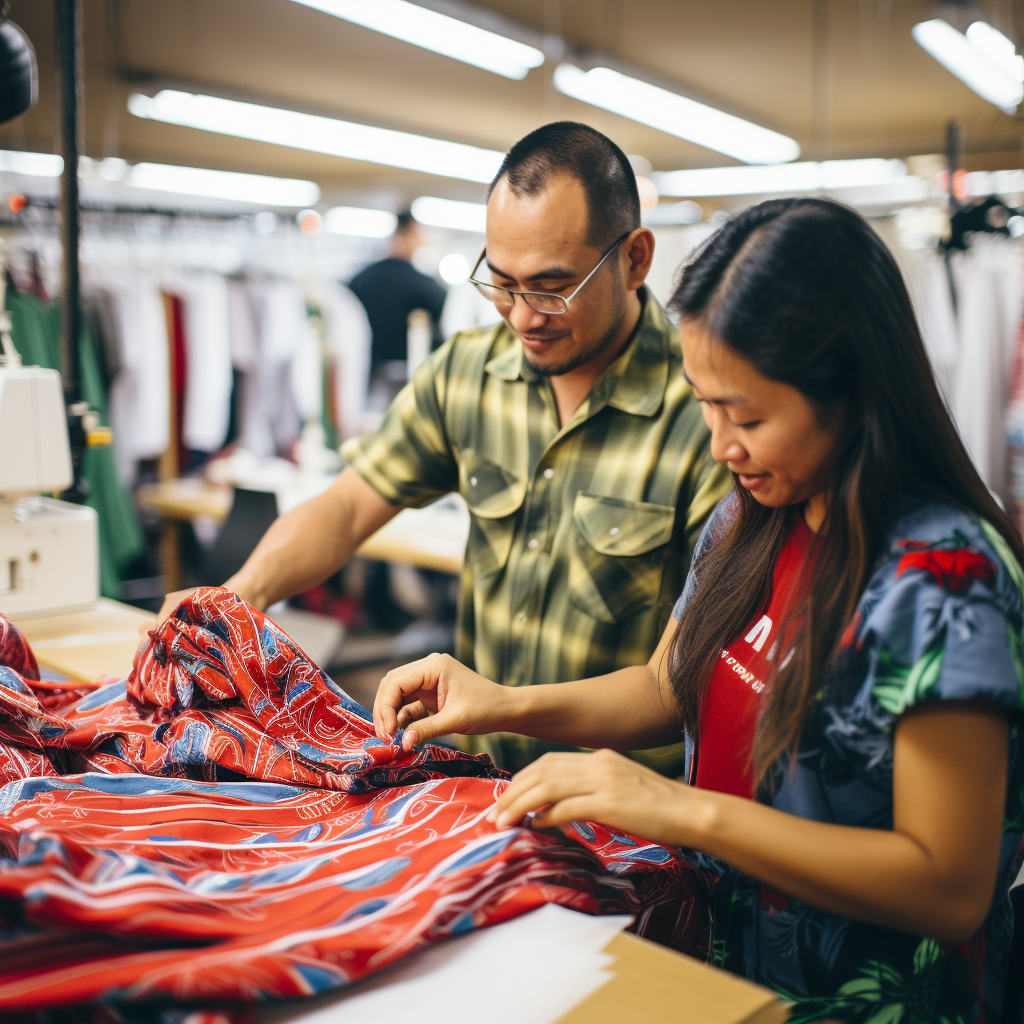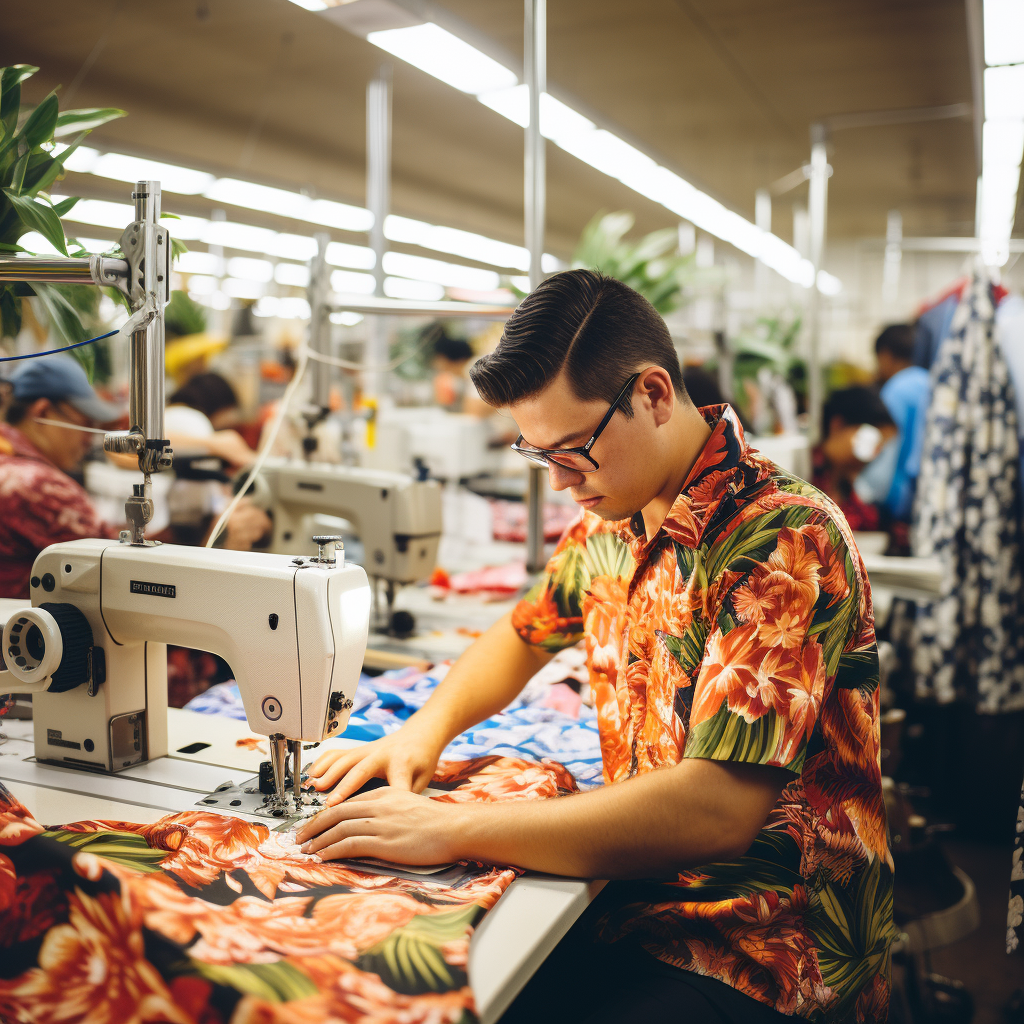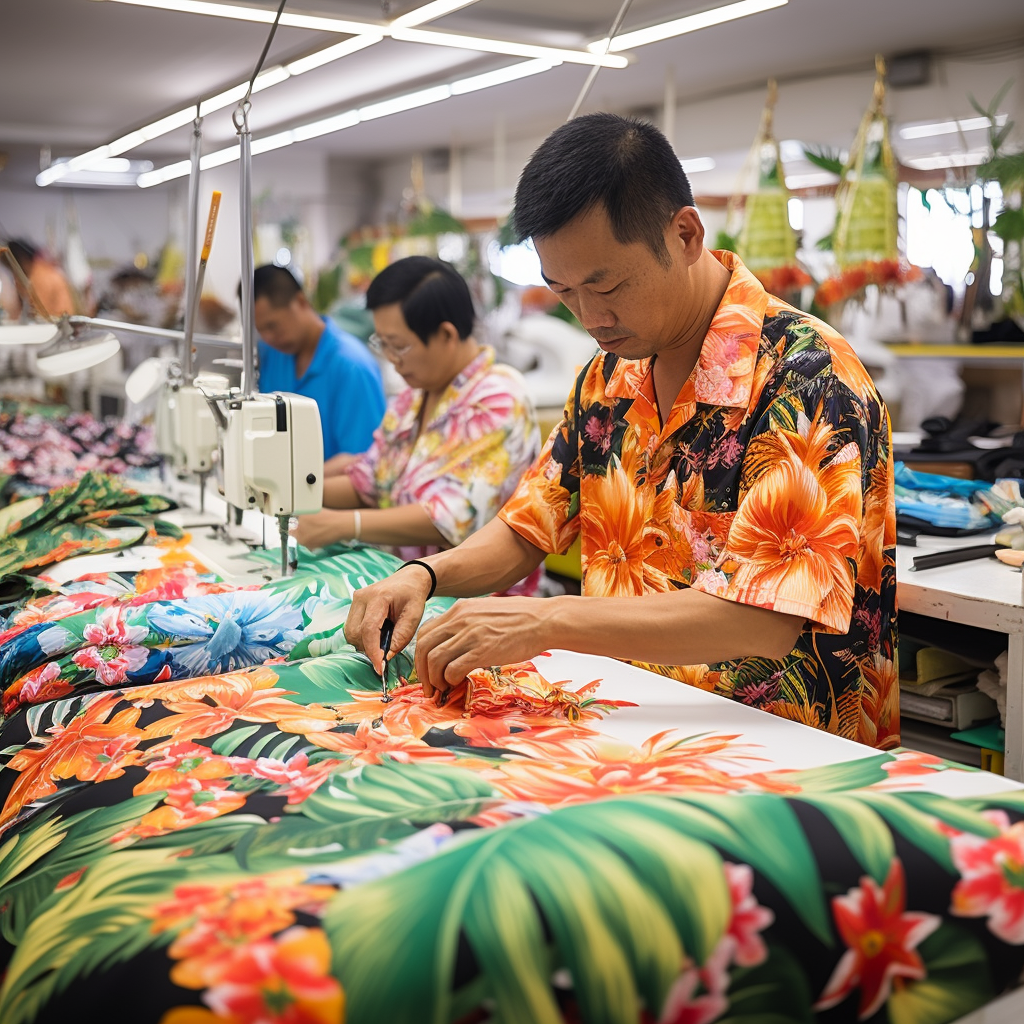The Hawaiian clothing industry is renowned globally, primarily due to its signature “Aloha shirts,” a style synonymous with the region’s warmth, tropical beauty, and laid-back lifestyle. The islands’ textile industry has a unique blend of traditional Polynesian designs and modern, eco-conscious production methods. The industry is made up of various manufacturers, each bringing its unique touch to the colorful and vibrant Hawaiian clothing scene.
The Importance of Choosing the Right Manufacturer
Finding a reliable clothing manufacturer can be critical for a successful retail venture. It’s about more than just who can provide the lowest cost. Factors such as the quality of materials, design capabilities, production turnaround time, and communication are vital considerations. Each of these components can significantly impact the finished product and your brand reputation. With the right manufacturer, you can bring your vision to life, while ensuring consistency in quality and timely delivery.
Table 1. Considerations When Choosing a Manufacturer
| Factor | Importance |
|---|---|
| Quality | High-quality products can increase customer satisfaction and loyalty. |
| Design | A manufacturer’s design capabilities can enhance your product range. |
| Production Time | Timely delivery is crucial to maintain inventory and meet demand. |
| Communication | Clear and prompt communication can prevent misunderstandings. |

1. Hilo Hattie – The Store of Hawaii
Overview
Hilo Hattie has been a staple in the Hawaiian clothing industry since its inception in 1963. The brand is famous for its expansive range of island-themed products, from clothing to jewelry and souvenirs, making it a popular destination for tourists and locals alike.
Unique Selling Proposition
What sets Hilo Hattie apart is their commitment to offer “Aloha from Hawaii.” They provide a comprehensive Hawaiian experience, not just through their products but also their customer service. Customers are treated with the warm “Aloha spirit” that the islands are known for.
Production and Quality Control
Hilo Hattie prides itself on its stringent quality control process. All products undergo a rigorous inspection to ensure that they meet the company’s high-quality standards. Moreover, the brand is committed to maintaining a close relationship with local artisans and suppliers, supporting the local economy and ensuring a unique and authentic Hawaiian touch in their products.
2. Jams World – The Colorful Art of Living
Overview
Jams World, headquartered in Honolulu, has been creating color-soaked, art-infused apparel since 1964. Known for their unique spin on the classic Aloha shirt, Jams World’s clothing items are instantly recognizable, and are much appreciated by customers who wish to wear art, and not just clothing.
Unique Selling Proposition
Jams World stands out due to their proprietary, art-driven print design process. They source art globally, which is then hand-painted and screen printed onto spun crushed rayon – a Jams World signature fabric. This creates vibrant, colorfast clothes that resist shrinking or wrinkling.
Production and Quality Control
Jams World maintains an on-site factory in Honolulu where each piece is meticulously created. The production process supports local labor, ensures quality, and allows for the brand’s signature details such as matched patterns and multi-colored buttons. By controlling their production process, Jams World guarantees garments that are not just beautifully designed but also consistently high in quality.
Table 2. Comparison of Hilo Hattie and Jams World
| Factor | Hilo Hattie | Jams World |
|---|---|---|
| Unique Selling Proposition | Comprehensive Hawaiian experience | Art-infused apparel, unique print design process |
| Production Process | Stringent quality control, local sourcing | On-site production, supports local labor |
3. Iolani Sportswear – Heritage of Aloha
Overview
Founded in 1953 by Keiji & Edith Kawakami, Iolani Sportswear is one of the oldest family-run clothing businesses in Hawaii. Over the years, Iolani has remained committed to producing high-quality Hawaiian clothing, while adapting to changing fashion trends.
Unique Selling Proposition
What sets Iolani apart is their seamless blend of traditional Hawaiian prints with contemporary designs. The brand manages to stay true to its roots while continuously evolving and staying current – a balancing act that few manufacturers can achieve.
Production and Quality Control
Iolani controls all aspects of its production process – from design and patterning to cutting and sewing – in its Honolulu factory. This allows them to keep a close eye on quality while enabling the flexibility to adapt to market trends quickly.

4. Kahala – The Original Aloha Shirt
Overview
Kahala has been synonymous with the Aloha shirt since it was established in 1936. Over the years, it has solidified its reputation as a purveyor of quality, style, and tradition, making it one of the most respected brands in the Hawaiian clothing industry.
Unique Selling Proposition
Kahala’s commitment to creating the “Original Aloha Shirt” sets it apart. Its pieces are timeless, fusing traditional Hawaiian patterns with modern cuts. Many of its designs are still hand-painted, maintaining the authenticity that the brand is renowned for.
Production and Quality Control
Kahala produces its garments locally in Honolulu. By controlling the entire process, from design to production, it ensures that each piece meets its exacting standards. Kahala shirts are known for their superior craftsmanship, attention to detail, and enduring quality.
Table 3. Comparison of Iolani Sportswear and Kahala
| Factor | Iolani Sportswear | Kahala |
|---|---|---|
| Unique Selling Proposition | Blend of traditional Hawaiian prints with contemporary designs | Creation of the “Original Aloha Shirt” |
| Production Process | Complete in-house production process in Honolulu | Local production ensuring superior craftsmanship |
5. Roberta Oaks – Power to the Flower
Overview
Roberta Oaks is a Honolulu-based designer known for her retro-inspired Aloha shirts. With an eco-conscious approach, Roberta Oaks offers a refreshing, modern twist to the classic Hawaiian shirt.
Unique Selling Proposition
The brand’s eco-friendly stance sets it apart. Roberta Oaks sources eco-fabrics and partners with small factories, emphasizing the need for sustainable fashion. Plus, their use of bold patterns and retro-modern designs provides a distinctive look that resonates with younger demographics.
Production and Quality Control
Roberta Oaks maintains a small-scale production approach. This not only allows them to have tight quality control but also supports ethical manufacturing practices.
6. Sig Zane Designs – Culturally Driven Designs
Overview
Sig Zane Designs, established in 1985, is a brand deeply rooted in Hawaiian culture. Renowned for their stunning textile designs, Sig Zane takes inspiration from the native flora, legends, and the dance of hula, blending tradition with wearable art.
Unique Selling Proposition
Sig Zane’s culturally driven designs set it apart from others. Each design stems from a deep understanding and appreciation of the Hawaiian culture, nature, and history, making every piece tell a story. The result is clothing that is not just visually striking but also rich in meaning.
Production and Quality Control
Sig Zane Designs produces most of its products locally in Hilo, Hawaii, with an unwavering commitment to quality. All designs are hand-cut, ensuring precision and attention to detail. By maintaining control over their production, they ensure every piece lives up to their high standards of quality and cultural authenticity.
Table 4. Comparison of Roberta Oaks and Sig Zane Designs
| Factor | Roberta Oaks | Sig Zane Designs |
|---|---|---|
| Unique Selling Proposition | Eco-conscious, retro-modern designs | Culturally driven designs, storytelling through apparel |
| Production Process | Small-scale production, eco-fabrics | Local production, hand-cut designs |

Conclusion
The Hawaiian clothing industry is a vibrant and diverse space, with manufacturers offering unique interpretations of the classic Aloha shirt. From Hilo Hattie’s comprehensive Hawaiian experience to Roberta Oak’s eco-conscious approach, there’s a manufacturer to meet different tastes and preferences. As consumers, understanding these differences can help in selecting a brand that aligns with individual style and values.
Whether it’s the rich cultural storytelling through Sig Zane’s designs or the timeless authenticity offered by Kahala, each brand brings something special to the table. By committing to local production and strict quality control, these manufacturers ensure they offer products that embody the essence of Hawaii while maintaining high quality and design standards.
FAQs
- Q: Why is local production important for these Hawaiian clothing manufacturers?
- A: Local production allows these manufacturers to maintain control over their quality, support the local economy, and preserve the authenticity of their Hawaiian designs.
- Q: What sets Kahala apart as a clothing manufacturer in Hawaii?
- A: Kahala’s commitment to creating the “Original Aloha Shirt”, combining traditional Hawaiian patterns with modern cuts, and their attention to superior craftsmanship sets them apart.
- Q: How does Roberta Oaks differentiate itself from other manufacturers?
- A: Roberta Oaks stands out for its eco-friendly stance, using eco-fabrics, partnering with small factories, and offering bold, retro-modern designs.
- Q: How does Sig Zane Designs incorporate Hawaiian culture into their clothing?
- A: Sig Zane Designs takes inspiration from Hawaiian culture, nature, and history. Each design tells a story, resulting in clothing rich in cultural significance.
You may also like
-
Why Sod Installation is the Quickest Way to a Beautiful Lawn?
-
The Role of Statutes and Case Law in Policy Limit Access
-
Setting Up a Home Theater with LG CineBeam Q The Ultimate Guide
-
Business Listing Sites in USA: 2025 Guide for Better Online Visibility
-
Is Your Lipstick Lying to You? What Packaging Says About the Product Inside

